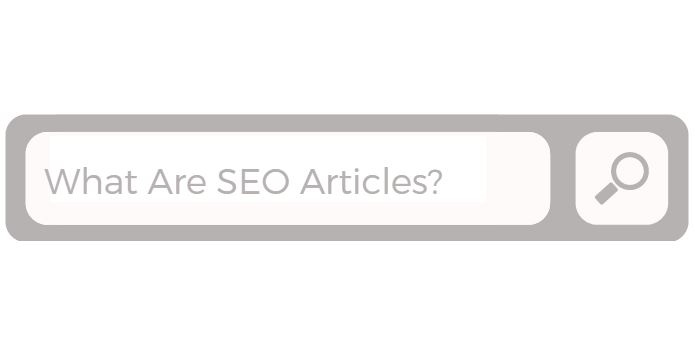What Are SEO Articles? 4 Writing Tips
by Leanne Mordue on 27-Apr-2022 09:00:00
 What are SEO articles, as opposed to other types of written content? While there is crossover with other types of article, SEO articles are written primarily to gain increased visibility on Google for your business for important keywords. There are certain rules to adopt when writing SEO content that can help increase your chances of a better ranking. However, a lot of the advice about writing SEO articles is like reading a recipe of spells from Macbeth. There is a tendency to overcomplicate things, and a lot of the advice is contradictory or unproven.
What are SEO articles, as opposed to other types of written content? While there is crossover with other types of article, SEO articles are written primarily to gain increased visibility on Google for your business for important keywords. There are certain rules to adopt when writing SEO content that can help increase your chances of a better ranking. However, a lot of the advice about writing SEO articles is like reading a recipe of spells from Macbeth. There is a tendency to overcomplicate things, and a lot of the advice is contradictory or unproven.
Our suggestion is to follow these four tips and not to worry too much. Google is pretty smart, so the best thing to do is to focus on making your content as relevant as possible to your target market.
1) Research The Right Keywords
When writing an SEO article, the place to start is with some decent keyword research. Find out what phrases and search queries people are using on Google and take a note of the number of times this is used on a monthly basis. This lets you know how competitive a keyword is. Keywords with hundreds or thousands of monthly searches are extremely competitive. You’ll be faced with a stiff challenge getting your content on page one for these terms. Longer or more specific (long tail) keywords, on the other hand, usually have fewer searches and are less competitive. They are also likely to be more specific to your business, and therefore to attract a more relevant readership. Make a varied list of relevant keywords that you want to use for articles, with monthly searches of between 10 and 50 hits. This is a good place to start.
2) Use Your Keywords Correctly
You can worry too much about keyword placement in SEO articles. Some people say you need to use the keyword exactly, X number of times. Others say it should constitute 2% to 3% of the total word count of your article.
There is no evidence to suggest this actually makes a difference. What is important is that your keyword is featured in the title of your article, then at some point in the first and final paragraph, but even this isn’t a hard and fast rule. In some articles you may use the keyword half a dozen times, and in another only twice. Be organic and don’t force the issue.
Even more important is that the content of your SEO article is relevant to the keyword you have chosen. If you are going to use the keyword spring planting ideas for sandy soil, then make sure your article is actually about this. Don’t write general content and try and sneak a keyword in by stealth, as this will not work. Even if you manage to trick Google, which is unlikely, you are very unlikely to attract a relevant readership.
Also, make sure your keywords read organically. A lot of search terms are not suitable for direct replication in sentences. It’s fine to mix it around a bit so that it is reasonable. Remember, it isn’t the Google search bots who will ultimately keep your business afloat; it’s the customers you will attract to your content, so keep user-friendliness at the foremost of your considerations when writing.
3) Write Something Of Value
This is by far the most important of our four tips. The Internet is so full of junk that you really do have to write something of real value for it to stand out on Google.
The Internet is primarily a means of communicating information. When you did your keyword research, you will have noticed that many of your long tail keywords are questions - implicitly or explicitly. These are the actual queries your target customers type into Google when searching for info. They will either be looking for a local service or for information about a problem.
Your articles give you a chance to answer these questions in a way that makes your customer’s lives easier. You are the expert in your own field of business, so use this knowledge to create some valuable content.
“How to” articles are a great place to start, as these provide helpful information and are easy to read in a short amount of time. Taking one of your keywords, look for a way to turn it into an interesting and relevant topic.
For example, the keyword online marketing for dentists could be used as the theme for any one of the following articles:
Top 10 Online Marketing Tips For Dentists
Your Ultimate Guide To Online Marketing For Dentists
3 Ways Online Marketing For Dentists Fails (And How You Can Get Better Results)
Knowing the approach to take, the level of detail to use and the right subjects to adopt will depend on the customers you are trying to attract. This will involve some knowledge of your target market and the kind of person who will be reading your blogs. Try to speak to their direct needs and give them the information they are looking for. For instance, content written for an engineer will be different to that written for a purchasing manager. You should also consider where in the purchase decision process your target reader is. Don’t jump the gun by expecting every reader to be immediately ready to hand over their money.
Here too, the keywords will provide a clue. Purely information seeking keywords suggest a reader who is lower down the sales funnel than one who is actively seeking services or products.
Using these keywords as examples:
Design ideas for children’s bedrooms: This search query is purely about information. In the article, provide a few helpful tips based on your expertise, and generally suggest how a service or product such as your own can help. You are planting the seed of an idea, not doing a sales pitch.
Interior design services in Wrexham: This query suggests a reader who is far closer to making a purchase decision. They are actively looking for businesses in a service area and will be open to sales proposition. This doesn’t mean you should launch into a full on sales pitch. Instead, make your content far more service focused, explaining the USP’s of your business and the reasons customers choose your service.
4) Make It The Right Length
SEO professionals have spilled a lot of ink about how long an SEO article should be. As no one outside of Google really knows how their search algorithm works, this necessarily involves some guesswork based on what works and what doesn’t – and this changes over time. It used to be that shorter blogs were considered better – around the 350 to 400 word mark – but this is no longer the case. Google values authoritative content, so the most highly indexed articles are normally at least 600 words in length.
But the most important guideline is to make your article the appropriate length for the subject you have chosen. There is no point trying to spin out an article to 800 words that could be better covered in 400. Waffle is extremely off putting to both search engines and customers. Most blogs publish a variety of content, with some 700 to 800 word blogs, and longer, 1,000 to 1,500 word blogs mixed in.
Shorter blogs are also acceptable as part of a balanced mix of content, as not everybody will have the time or inclination to trawl through a long blog article, especially in some sectors. But don’t depend on short pieces to get you high rankings in Google. You need to demonstrate your industry knowledge in order to do this.
Take a look at some successful blogs in your industry and get a feeling for what works and what doesn’t.
Content is still king when it comes to lead generation and SEO. To find out more about developing the right content marketing and blogging strategy for your business, give us a call today. At JDR we offer a flexible range of marketing services to meet the needs of all types of business.
- Inbound Marketing (SEO, PPC, Social Media, Video) (831)
- Strategy (368)
- Sales & CRM (197)
- Marketing Automation & Email Marketing (190)
- Business Growth (168)
- Website Design (162)
- Hubspot (141)
- Lead Generation (117)
- Google Adwords (100)
- Content Marketing (94)
- Conversion (53)
- Case Studies (49)
- News (47)
- Ecommerce (39)
- Webinars (34)
- SEO (26)
- AI (20)
- Events (19)
- LinkedIn Advertising (17)
- Video (17)
- Video Selling (15)
- Software training (13)
- Niche business marketing (11)
- The Digital Prosperity Podcast (10)
- HubSpot Case Studies (7)
- Facebook Advertising (6)
- Web Design Case Studies (1)
- February 2026 (2)
- January 2026 (12)
- December 2025 (15)
- November 2025 (6)
- October 2025 (17)
- September 2025 (16)
- August 2025 (14)
- July 2025 (14)
- June 2025 (5)
- May 2025 (19)
- April 2025 (15)
- March 2025 (13)
- February 2025 (13)
- January 2025 (8)
- December 2024 (2)
- November 2024 (4)
- October 2024 (21)
- September 2024 (4)
- August 2024 (8)
- July 2024 (14)
- June 2024 (16)
- May 2024 (25)
- April 2024 (15)
- March 2024 (18)
- February 2024 (5)
- January 2024 (10)
- December 2023 (6)
- November 2023 (10)
- October 2023 (13)
- September 2023 (12)
- August 2023 (14)
- July 2023 (13)
- June 2023 (14)
- May 2023 (15)
- April 2023 (13)
- March 2023 (14)
- February 2023 (13)
- January 2023 (15)
- December 2022 (13)
- November 2022 (6)
- October 2022 (8)
- September 2022 (22)
- August 2022 (15)
- July 2022 (13)
- June 2022 (16)
- May 2022 (14)
- April 2022 (16)
- March 2022 (17)
- February 2022 (11)
- January 2022 (8)
- December 2021 (6)
- November 2021 (7)
- October 2021 (11)
- September 2021 (10)
- August 2021 (7)
- July 2021 (7)
- June 2021 (4)
- May 2021 (4)
- April 2021 (1)
- March 2021 (3)
- February 2021 (5)
- January 2021 (4)
- December 2020 (7)
- November 2020 (6)
- October 2020 (5)
- September 2020 (9)
- August 2020 (18)
- July 2020 (17)
- June 2020 (17)
- May 2020 (10)
- April 2020 (21)
- March 2020 (24)
- February 2020 (21)
- January 2020 (12)
- December 2019 (23)
- November 2019 (12)
- October 2019 (14)
- September 2019 (16)
- August 2019 (15)
- July 2019 (13)
- June 2019 (6)
- May 2019 (8)
- April 2019 (4)
- March 2019 (2)
- February 2019 (2)
- January 2019 (2)
- December 2018 (3)
- November 2018 (24)
- September 2018 (11)
- August 2018 (9)
- June 2018 (3)
- May 2018 (6)
- April 2018 (14)
- March 2018 (12)
- February 2018 (16)
- January 2018 (15)
- December 2017 (15)
- November 2017 (18)
- October 2017 (23)
- September 2017 (19)
- August 2017 (28)
- July 2017 (27)
- June 2017 (25)
- May 2017 (18)
- April 2017 (17)
- March 2017 (16)
- February 2017 (17)
- January 2017 (14)
- December 2016 (21)
- November 2016 (27)
- October 2016 (25)
- September 2016 (16)
- August 2016 (20)
- July 2016 (19)
- June 2016 (14)
- May 2016 (20)
- April 2016 (24)
- March 2016 (22)
- February 2016 (28)
- January 2016 (27)
- December 2015 (28)
- November 2015 (19)
- October 2015 (9)
- September 2015 (12)
- August 2015 (5)
- July 2015 (1)
- June 2015 (10)
- May 2015 (3)
- April 2015 (11)
- March 2015 (14)
- February 2015 (15)
- January 2015 (12)
- December 2014 (2)
- November 2014 (23)
- October 2014 (2)
- September 2014 (2)
- August 2014 (2)
- July 2014 (2)
- June 2014 (7)
- May 2014 (14)
- April 2014 (14)
- March 2014 (7)
- February 2014 (2)
- January 2014 (7)
- December 2013 (9)
- November 2013 (14)
- October 2013 (17)
- September 2013 (3)
- August 2013 (6)
- July 2013 (8)
- June 2013 (4)
- May 2013 (3)
- April 2013 (6)
- March 2013 (6)
- February 2013 (7)
- January 2013 (5)
- December 2012 (3)
- November 2012 (2)
- September 2012 (1)
Subscribe by email
You May Also Like
These Related Blogs

Google Keyword Planner Has Updated! Has Keyword Research Changed Forever?
Keyword research is one of the most important parts to get right at the start of any SEO campaign. It can really make or break the campaign. If it isn …

3 Costly Google AdWords Mistakes You Need To Avoid!
If you’re not confident working with Google AdWords, it can potentially be a daunting and expensive task. Costs can soon spiral out of control if you …

Local Business Marketing: 4 Steps To Attract Business From Your Local Area
As many of you will know, the amount of people that use the internet on a daily basis is continuing to increase and having an online presence if you a …




